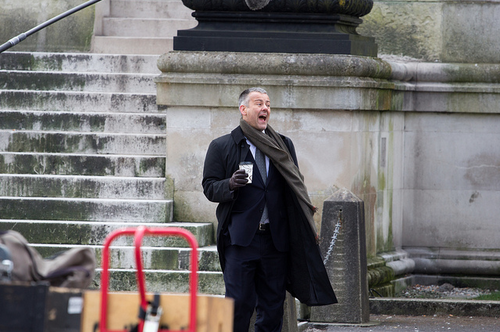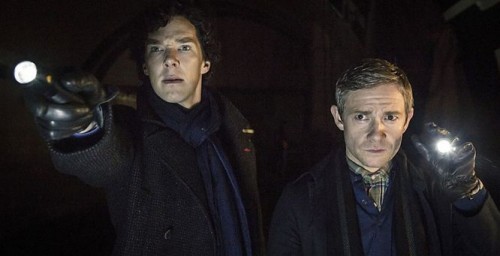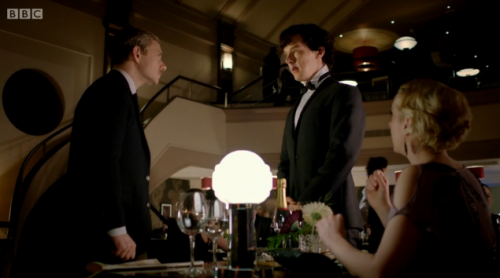
BBC’s Sherlock has become one of my favorite shows on television, and it was immensely fun having some new material and quelling the peremptory curiosity left by the end of last season. It was genuinely enjoyable seeing Holmes back on the screen, even though, last night, Sherlock’s self-absorbed callousness was especially in-your-face – sort of making me wonder why I like BBC’s Holmes at all. All of his flaws were on high display, and they were made all the more irritating by his inability to apologize. And yet he remains compelling, not just immensely likeable, but even lovable, an obsession for some viewers (myself included) which the showrunners not-so-subtly parodied with The Empty Hearse Fan Club. And Sherlock’s disdain for them parallels Moffat’s condescension to the his viewers, opening the episode with a wild bungee jump and James Bond-esque kiss of Molly, followed by a breezy departure. Certainly some viewers would enjoy such action-hero panache, but we’re made to understand, early on, that this conventional smoothness isn’t, at all, who Sherlock is.
Yet panache dominates the episode: improbable deductions to free himself from a black site-looking prison (cut to Pierce Brosnan gun barrel sequence), specially smart tradecraft in a formal restaurant, and a longstanding plot to trick Moriarty into forcing Sherlock to fake his own death. Given the opening sequence, it’s hard to know how much of this is Moffat satirizing our expectations of Sherlock and how much is genuine action-hero screenwriting. Despite all of this, Watson’s new wife, Mary, pronounces the audience’s inevitable verdict: “I like him.”
Her approval works so well for the episode because she hasn’t yet had much space to be impressed by his deductive talent. She sees somehow a more human Sherlock – and moreover, at or near his worst – and sees through to someone inherently lovable.
Arthur Conan Doyle’s Sherlock himself tends to be unpleasant, asocial and, at times, bordering misanthropy. As he was writing, new scientific methods for detective-work were becoming available. And while technological progress allowed the ‘man of action’ in literature to become adapted into Doyle’s aloof intellectual hero, at the same time industrialization and urban development – themselves products of the new progress – were threatening to depersonalize people, render them anonymous, destroy individual identity (Eliot: “Unreal City… death had undone so many… each man fixed his eyes before his feet.”)
 Doyle’s Sherlock navigated this tension marvelously by using his technique to reveal the individuality buried underneath the shuffling crowd. This is one reason why detective stories are (a) broadly ‘modern’ and (b) thrive in urban settings – it’s the trick of finding the needle in the haystack, of penetrating the veneer of uniform anonymity. All of a sudden, the sameness becomes specific, personal, and unique. The smallest details of someone flash into an utterly distinct backstory: Watson may seem typical and mundane, but to the trained eye, he’s a war veteran with a psychosomatic limp who’s looking for a flatmate – and all on first look. Details, and the deduction they make possible, reconstruct a world poised to be explored, discovered, and wondered at. The most eccentric and bizarre and ‘curious’ scenarios become drawn into the warp and weave of everyday life.
Doyle’s Sherlock navigated this tension marvelously by using his technique to reveal the individuality buried underneath the shuffling crowd. This is one reason why detective stories are (a) broadly ‘modern’ and (b) thrive in urban settings – it’s the trick of finding the needle in the haystack, of penetrating the veneer of uniform anonymity. All of a sudden, the sameness becomes specific, personal, and unique. The smallest details of someone flash into an utterly distinct backstory: Watson may seem typical and mundane, but to the trained eye, he’s a war veteran with a psychosomatic limp who’s looking for a flatmate – and all on first look. Details, and the deduction they make possible, reconstruct a world poised to be explored, discovered, and wondered at. The most eccentric and bizarre and ‘curious’ scenarios become drawn into the warp and weave of everyday life.
Of course, Sherlock isn’t the only one privileged to lift the veil on Eliot’s faceless London. Watson, too, is a purveyor of the extraordinary in his acquaintance with Sherlock. As an ‘ordinary’ person partnered with the master of human observation, he provides the touchstone for the audience’s look into Sherlock’s world. We’re placed at Sherlock’s vantage point through Watson who also, incidentally, provides the emotional color which Holmes lacks. Watson finds deep friendship and genuine kindness in an outwardly narcissistic man, and Sherlock’s professions of friendship to Watson are so touching because there, more than anywhere else, Sherlock manages to find an utterly interesting individuality in the ordinary man.
The viewership’s identification with Watson is, therefore, crucial both to Doyle’s and Gatiss’s/Moffat’s telling. Unfortunately, last night’s overemphasis on Sherlock’s talent threw the story out of balance; apart from the comedic montage of increasingly abject stages for Watson’s physical aggression, he fails to develop much of a voice. The fire rescue felt especially out-of-place, as it didn’t fit into the story and attempted to rectify Watson’s real emotional grievances with yet another display of Doyle’s-Sherlock-meets-James-Bond dash and bravado. All that said, the man behind the monitors at the end, seemingly a Sherlock-esque mastermind with a simultaneous voyeurism of the personal – works too, on one level, as a type of us, the viewers, and as such it was the most promising and intriguing scene of the episode.
All that said, Season 2 left probably one of the most talked-about unresolved endings in television history, and a resolution of The Reichenbach Fall and a tight, cogent story in the same episode was probably too much to demand. But Sherlock Holmes has always been about urban dislocation barely managed by a fascination with the details, and the ability to construct a story from them – Moriarty’s Hansel and Gretel, last season, was a perfectly-done example of this narration. Like Sherlock, Gatiss and Moffat are at their strongest when they’re well-focused and leading us, detail by detail, into some fantastic story which emerges out of the everyday; the show tends to be weaker when it frontloads Sherlock’s technical virtuoso, and last night the frenetic pace just out of check.
The train scene at the end felt like another gimmicky Sherlock ruse, as he fakes emotion while eliciting forgiveness from Watson. Sherlock’s legacy of imbuing the mundane with wonder only works if Holmes himself is allowed to remain everyday: his eccentrities and vulnerability are critical to prevent him from becoming an action hero, standing above everyone else like a Baker Street Man of Steel. Which was why it felt, too, a little disappointing that Sherlock and Mycroft had orchestrated the entire Reichenbach scenario. For this episode’s emotional lack, we can look forward to the next episode, and the man behind the monitors is immensely promising for restoring the detective’s occasional helplessness, which supervillain Jim Moriarty can no longer provide.
Thoughts that didn’t fit above:
-Molly’s fiancée, cosidering the strange interaction between him and Sherlock, may tie in to a bigger plot in future episodes. Whether it’s a love triangle (low odds), criminal contact, or potential gaffe for Cumberbatch’s Sherlock, it could certainly be interesting.
-Gunpowder plot felt a little weak. It could benefit from being tied in, later in the series, to a scheme from our new villain.
-In The Reichenbach Fall and The Empty Hearse, the running threads of Sherlock’s relationship to the police, and to the press, kind of reached their full potential. That is, it’s going to be hard to keep these as major aspects of the show without some sort of stagnation.
-While a Molly love triangle would be very difficult to do without falling flat, his relationship with Irene Adler was a high point of Sherlock’s character for me, and it seems like we’ll need a stronger female presence than just Mrs. Hudson and Mary. It wouldn’t be surprising for Mary to grow into that role; some suggestions of duplicity on her end made ample space for that possibility.
-It would be nice to see the pace slow down a little. While it’s interesting to see Moffat and Gatiss push some structural boundaries and get a little experimental, I felt an almost Homeland-ish anxiety watching it, and they’re not quite as practiced as the old 24 crew when it comes to managing such a fast pace.
-At the same time, this was originally a fun side project for the two without anticipation of the success it’s achieved, and it’s nice to see the writers keeping some of that whimsical freedom. It really came through in the dialogue, which was every bit as sharp and attention-holding as usual.

COMMENTS
2 responses to “On TV: BBC’s Sherlock, “The Empty Hearse””
Leave a Reply
















Good review Will
spot on. I suspect Molly’s new beau is a criminal. Her comment about their quiet pub life and her previous relationship with Moriarty indicate that she can easily be misled. It was fun to follow Richard Sherman with Sherlock Holmes Sunday night. Fast paced character studies indeed!